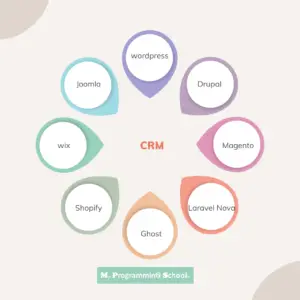You can find the most commonly used CMSs for building websites and maintaining them. A CMS can be the ideal solution to build content-rich web sites. If you are unable to maintain the site yourself, then you may lose your business operations. Unlike the previous generation, the Content Management System is opensource and can easily be maintained. These roundups concentrate on the most important platforms in a market like e-commerce and other specialized services. A recent report by W3Tech reveals 80% of the total CMS use across websites.
What is a CMS?
A Content Management System (CMS) is a software application that allows users to create, manage, and publish digital content without needing specialized technical knowledge. A CMS provides a user-friendly interface for non-technical users to manage websites and other digital content, making it easier for businesses, organizations, and individuals to maintain an online presence.
Which is the best CMS platform?
The best CMS platform for a particular website depends on a number of factors, such as the size and complexity of the website, the type of content being published, and the resources and budget available. Some popular CMS platforms include WordPress, Drupal, and Joomla.
What is a CMS platform?
A CMS platform is a web-based software application that provides a central repository for managing and organizing digital content, as well as tools for creating, editing, and publishing content to a website or other digital media.
How to choose the best CMS platform for your website?
When choosing a CMS platform, it is important to consider factors such as ease of use, scalability, security, and integration with other tools and systems. Additionally, it is important to consider the level of technical expertise required to use the platform and the cost of using the platform, as well as the availability of support and resources for the platform.
15 Best CMS Software Solutions in 2023
- WordPress – A popular open-source CMS platform known for its ease of use and large library of plugins and themes.
- Joomla – An open-source CMS platform that provides a wide range of features and functionality.
- Drupal – A highly customizable open-source CMS platform used by government and enterprise websites.
- Magento – A powerful e-commerce CMS platform used by online retailers.
- Wix – A cloud-based website builder with a drag-and-drop interface.
- Squarespace – A website builder and CMS platform known for its sleek and modern designs.
- Shopify – A popular e-commerce CMS platform used by small and large businesses.
- Weebly – A website builder and CMS platform with a range of e-commerce features.
- Ghost – A modern open-source blogging platform and CMS.
- BigCommerce – An e-commerce CMS platform with a range of features for online stores.
- OpenCart – A free and open-source e-commerce platform.
- Craft CMS – A flexible and scalable content management platform for custom web projects.
- Laravel Nova – A Laravel-based CMS platform for Laravel developers.
- October CMS – A user-friendly open-source CMS platform based on the Laravel framework.
- Contentful – A cloud-based headless CMS platform that provides a powerful API for developers.
What should be considered when choosing a CMS?
When choosing a CMS, it is important to consider factors such as ease of use, scalability, security, and integration with other tools and systems. Additionally, it is important to consider the level of technical expertise required to use the platform and the cost of using the platform, as well as the availability of support and resources for the platform.
Best content management system There is no one “best” content management system, as the best choice depends on the specific needs and requirements of the website and its users. Some popular CMS platforms include WordPress, Drupal, and Joomla.
Content management system examples
- WordPress
- Joomla
- Drupal
- Magento
- Wix
WordPress content management system WordPress is a popular open-source content management system that is widely used for creating and managing websites. WordPress offers a user-friendly interface, a large library of themes and plugins, and a vibrant community of users and developers.
Best CMS for developers
The best CMS for developers depends on their specific needs and requirements, such as the type of website being developed, the level of customization required, and the preferred programming language. Some popular CMS platforms for developers include WordPress, Drupal, and Laravel Nova.
Open source CMS An open-source
CMS is a CMS platform that has an open-source license, allowing developers to access and modify the source code of the platform as needed. Examples of open-source CMS platforms include WordPress, Drupal, and Joomla.
Web content management system
A web content management system (WCMS) is a type of CMS platform specifically designed for managing and publishing digital content to websites. A WCMS provides a central repository for organizing and managing content, as well as tools for creating, editing, and publishing content to a website. Examples of WCMS platforms include WordPress, Drupal, and Magento.
FAQ: CRM Software
5 Examples Of Content Management System
5 example of CRM are: WordPress, Joomla, Drupal, Magento,Wix
What is a CMS?
A Content Management System (CMS) is a software that allows users to create, manage, and publish digital content.
What is the purpose of a CMS?
The purpose of a CMS is to make it easier for non-technical users to manage and publish digital content.
How does a CMS work?
A CMS provides a user-friendly interface for managing digital content, as well as tools for creating, editing, and publishing content.
What are the benefits of using a CMS?
Using a CMS can save time and resources by making it easier to manage and publish digital content, and by reducing the need for technical expertise.
What are the different types of CMS platforms?
There are several types of CMS platforms, including open-source, commercial, and web content management systems.
